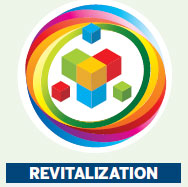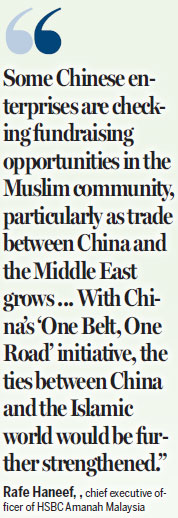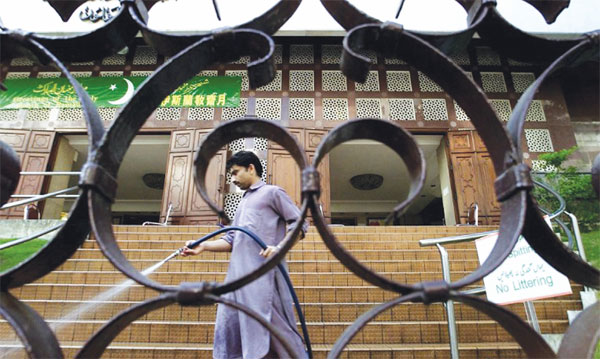SAR right on track to be region's Islamic bonds center
Updated: 2015-06-02 07:01
By Emma Dai in Hong Kong(HK Edition)
|
|||||||||
|
A Muslim washes the stairway leading up to the Kowloon Monsque in Tsim Sha Tsui during Ramadan, the month of fasting. At the very top end of the rating range around the globe, only a handful of issuers - Luxemburg, the Islamic Development Bank, Hong Kong and the UK - are issuing Islamic instruments. Besides London, Dubai and Kuala Lumpur, Hong Kong is able to help Chinese mainland enterprises seek fundraising opportunities in the Islamic world, analysts say. Asia News Photo |
Editor's note: With flexible infrastructure for sukuks, or Islamic bonds, the SAR is confident of attracting global investors to propel the city to being the region's Islamic finance hub. What Hong Kong needs, according to experts, are high-profile corporate issuers.
Upon the success of the latest sukuk, or Islamic bond, offering from the SAR government, Hong Kong has reaffirmed its ambition to become the region's Islamic finance center.
But, bankers and analysts said it will take time for the private sector to hop on the bandwagon.
"The latest issuance strengthens our relationship with global investors and demonstrates the flexibility of Hong Kong's Islamic finance platform I hope the latest sukuk issuance will catalyze the growth of the sukuk market in Hong Kong and attract more issuers and investors to participate in our Islamic finance platform," said Financial Secretary John Tsang Chun-wah in a statement on May 28.

Following the inaugural issuance last September, the SAR government announced last Thursday that it sold another batch of $1 billion of five-year sukuk bonds with terms that comply with Islamic religious laws. The debt instrument was priced at 35 basis points higher than the US Treasury bonds of the same tenor.
The offering attracted $2 billion orders from 49 global institutional investors, two times the issue size. About 43 percent of the sukuks was allocated to Asia, while a similar proportion, 42 percent, was distributed to the Middle East bidders. European buyers snapped up the remaining 15 percent.
The SAR offering is welcomed because the global sukuk market is short of offerings from high-rating issuers, said Christian de Guzman, vice-president and senior analyst at Moody's Investors Service.
"At the very top end of the rating range, only a handful of issuers - Luxemburg, Islamic Development Bank, Hong Kong and the UK - are issuing Islamic instruments," de Guzman said. "Under the capital requirement of Basel III, many investors - banks for example - are required to hold high-quality assets," he said.
The SAR is rated "AAA" by Standard and Poor's and "Aa1" by Moody's.
Denominated in the US dollar has added to sukuk's attractiveness, de Guzman said.
"There really isn't much Hong Kong government credit available in US dollar. No matter it's sukuk or a conventional bond, a US dollar issuance would be fairly attractive to certain investors. Some institutions are mandated to invest only in hard currencies, mostly the greenback," he said.
"But, in the corporate field, it may take some time for issuers in Hong Kong and the Chinese mainland to be comfortable with Islamic instruments, the structure of which is much more complicated than conventional bonds," he added.
Hong Kong's inaugural sukuk used Ijarah structure, which requires an underlying tangible asset of at least 100 percent of the issuance amount. In comparison, the latest sukuk applied the Wakalah structure, which allows it to underpin tangible assets at only one-third of the issuance size.
"The use of the 'asset light' structure can set a benchmark for potential issuers in the private sector," Tsang emphasized.

Ahead of the two government offerings, Hong Kong made legislative changes in 2013 to provide Islamic securities with tax treatment comparable to conventional debts. In his 2014 Policy Address, Chief Executive Leung Chun-ying said "attracting Islamic financial transactions" was one of the approaches to developing the city into "a more comprehensive fund and asset- management center". "We've been talking to a few corporate clients who could be interested in sukuk. It's only a matter of time for the first issuer to come," said Rafe Haneef, chief executive officer of HSBC Amanah Malaysia.
"At this moment, the Islamic financial centers are London, Dubai and Kuala Lumpur, where you see a lot of sukuk activities. Hong Kong, however, has created the legal and taxation infrastructure and demonstrated its ability (to issue Islamic bonds) at attractive rates. Hong Kong can be a center of Islamic financial transactions in the region," Haneef said.
According to Haneef, the city would need one landmark corporate sukuk transaction to boost private sector's interests. "One successful debut would create a lot of awareness. Many issuers would follow," he said. "Ideally, the first corporate issuer would be a listed company with a record of conventional bonds issuance. The conventional bonds could serve as benchmark and help with investor awareness. It would then be a lot easier to bring the company into the sukuk market."
Haneef said the main reason for a corporation to issue sukuks is to strategically diversify its investor base as well as source of funding. "Many companies go to alternative bond markets to tap different currencies. You would have another market to rely on if there is a liquidity crush," Haneef said.
"Some Chinese enterprises are checking fundraising opportunities in the Muslim community, particularly as trade between China and the Middle East grows. Many projects in the Middle East seek Islamic financing. Companies familiar with that would have better chances for contracts. With China's 'One Belt, One Road' initiative, the ties between China and the Islamic world would be further strengthened," he said.
(HK Edition 06/02/2015 page12)
